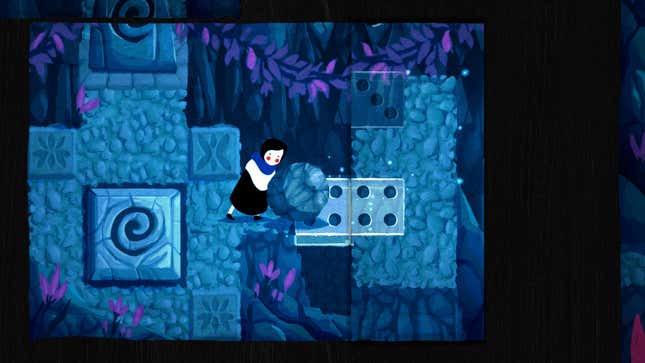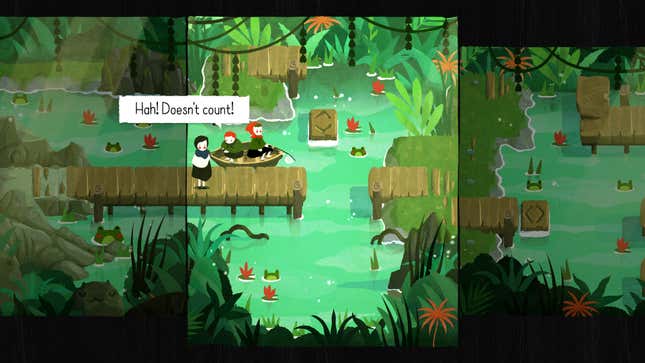The first thing that will jump out to you when starting the new indie puzzle game Paper Trail is how damn good it looks. A gorgeous color palette, lovingly crafted characters and environments that look like an arts-and-crafts project, and an almost tangible feel to the visible fold lines on the screen are wonderful to behold. That’s a good thing for a game that will have you staring at the screen for minutes at a time due to its complex puzzles. And that’s the game—well-designed puzzles in a beautiful art style packaged into a roughly seven-hour experience that doesn’t overstay its welcome. It’s as simple as that, and while there are some shallow elements to the game, it nails the most important part of enjoyable puzzle design.
The big selling point of Paper Trail is its unique approach to puzzles. The game takes place in a 2D world viewed from above that you navigate through from screen to screen a la a classic Zelda title. But here the path is always impeded by a broken bridge, missing platforms, or some other obstacle. To overcome these obstacles, you can fold the pieces of the screen in on itself. Imagine each screen is a collection of flat paper pieces and that your job is to make origami out of them.

By folding the screen at its corners and edges, you’re able to reveal the underside of the map and connect it in ways that let you progress forward. That starts simple, with puzzles just requiring you to fix a single path, but Paper Trail slowly adds new twists to the formula. Later levels introduce mechanics such as boulders that hold paper down and platforms that can swivel. Each new addition forces you to think a little more about how everything in the game works together to solve a puzzle.
The narrative push behind the puzzles comes in the form of the plucky protagonist Paige, a girl leaving home to live a life of academia. Her studies revolve around physics concepts like folding space, the skill that lets her manipulate the world and solve the game’s puzzles. Paper Trail regularly tries to put the narrative in the forefront in the form of short storybook sections that require you to fold through scenes, but the story is pretty shallow and doesn’t add to the experience. If anything, those moments are just a distraction from the main event.

That creates an imbalance that could be a problem for some players. If you come to Paper Trail expecting a fun puzzle game intercut with an interesting narrative, you’ll be disappointed. This is a puzzle gauntlet. Every single screen you pass through is just another challenge. Solve one and another awaits ad infinitum. It’s akin to the equally delightful but relentless Dungeons of Dreadrock, which is itself a marathon of puzzles with no rest.
I personally don’t have a problem with that, and find the challenge of solving one puzzle after another to be what makes Paper Trail enjoyable. But even I have to take it in short bursts. If anything is going to pull you through this game, it’s not the narrative or the world, but rather your own desire to complete these challenges and experience the satisfaction they bring. Even the gorgeous art style might not be enough for some, but for those who do find joy in the endless folding screens of Paper Trail, it is the cherry on top.
.


